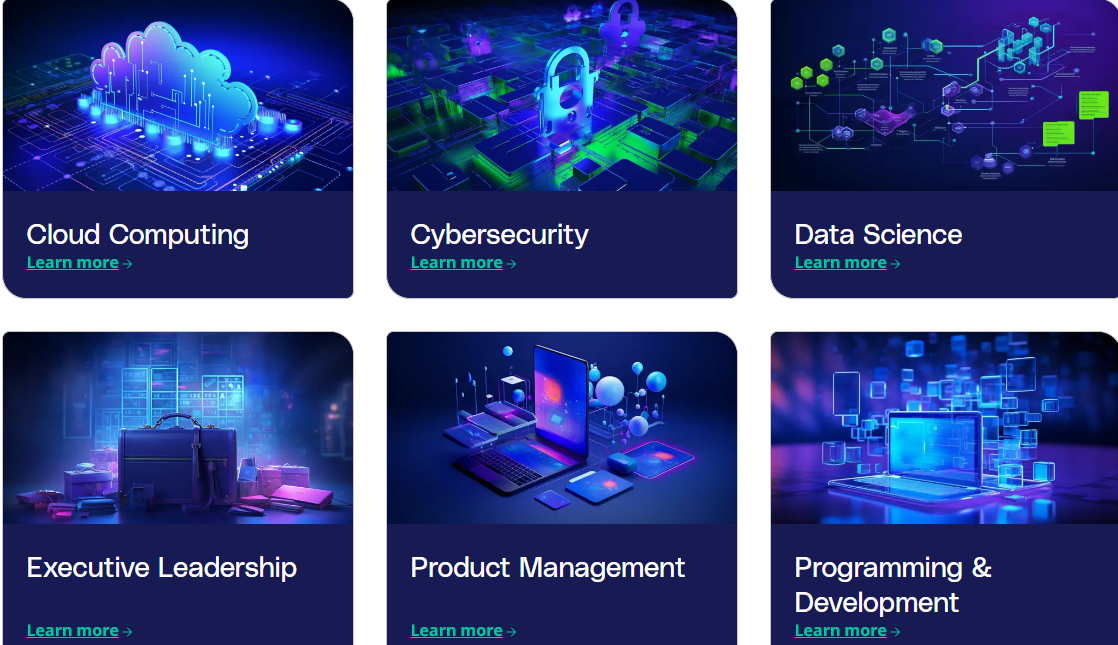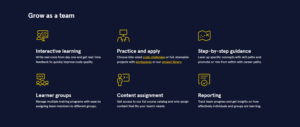Udacity Review 2025 – Udacity is an online education platform that offers a variety of courses and programs, primarily focused on technology and career development. Founded in 2011, it aims to provide accessible, high-quality education in fields such as data science, artificial intelligence, programming, and digital marketing.
Udacity is known for its “Nanodegree” programs, which are designed in collaboration with industry leaders to ensure that the curriculum is relevant and aligned with current job market demands. These programs typically include hands-on projects, mentorship, and career services to help learners build practical skills and enhance their employability.
The platform caters to a wide range of learners, from beginners looking to start a new career to professionals seeking to upskill or transition into new roles. Udacity’s emphasis on real-world applications and partnerships with companies like Google, Amazon, and IBM further enhances its reputation as a valuable resource for those looking to advance their careers in technology.
Table of Contents
History and background Udacity

Udacity is an online learning platform that was founded in 2011 by Sebastian Thrun, David Stavens, and Mike Sokolsky. The platform emerged from a free computer science course offered by Thrun and his colleagues at Stanford University, which attracted over 160,000 students from around the world. This overwhelming response highlighted the potential for online education, leading to the establishment of Udacity.
Initially, Udacity focused on providing free courses in computer science and programming. However, as the platform evolved, it began to offer “Nanodegree” programs, which are more structured and designed in collaboration with industry leaders to ensure that the curriculum meets the needs of employers. These programs cover a range of topics, including data science, artificial intelligence, programming, and digital marketing.
Udacity’s mission is to democratize education and provide accessible, high-quality learning opportunities to individuals seeking to enhance their skills or transition into new careers. The platform has partnered with various companies, including Google, Amazon, and IBM, to create relevant content and provide students with real-world projects and mentorship.
Over the years, Udacity has gained recognition for its innovative approach to online education, focusing on practical skills and career readiness, making it a popular choice for learners looking to advance their careers in technology and related fields. Udacity Review 2025
Mission and vision

Udacity mission’s is to democratized education by providing accessible, high quality learning opportunities that empower individuals to advance their carriers in technologies and other fields. The platform focuses on offering industry-relevant courses and nanodegree programs designed in collaboration with leading companies to ensure that learners acquire the skills needed in the job market.
The vision of Udacity is to create a world where anyone, anywhere can transform their lives through education. By leveraging technology and innovative teaching methods, Udacity aims to bridge the gap between traditional education and the evolving demands of the workforce, ultimately fostering a more skilled and adaptable global workforce.
Types of courses offered
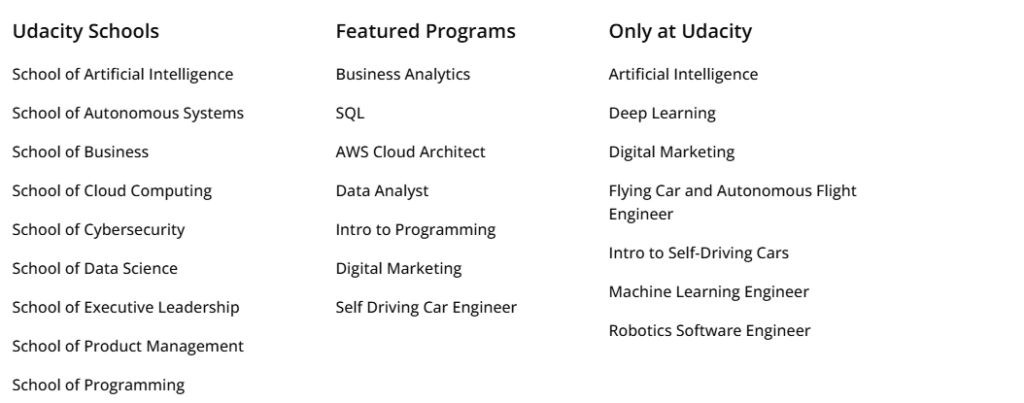
Udacity offers a variety of courses across several domains, primarily focusing on technology and professional development. Here are some of the main types of courses you can find on Udacity:
- Nanodegree Programs: These are comprehensive, project-based programs designed to help learners gain specific skills in areas such as Data Science, Artificial Intelligence, Machine Learning, Web Development, and Digital Marketing.
- Free Courses: Udacity provides a selection of free courses that cover fundamental topics in programming, data analysis, and other tech-related fields.
- Short Courses: These are typically shorter in duration and focus on specific skills or tools, such as Python programming, SQL, or cloud computing.
- Career Services: Many of the Nanodegree programs include career services, such as resume reviews and interview preparation, to help learners transition into new roles.
- Industry Partnerships: Udacity collaborates with leading companies to create courses that are aligned with industry needs, ensuring that the skills taught are relevant and in demand.
- Self-Paced Learning: Most courses are designed to be self-paced, allowing learners to progress through the material at their own speed. Udacity Review 2025
Popular courses and specializations
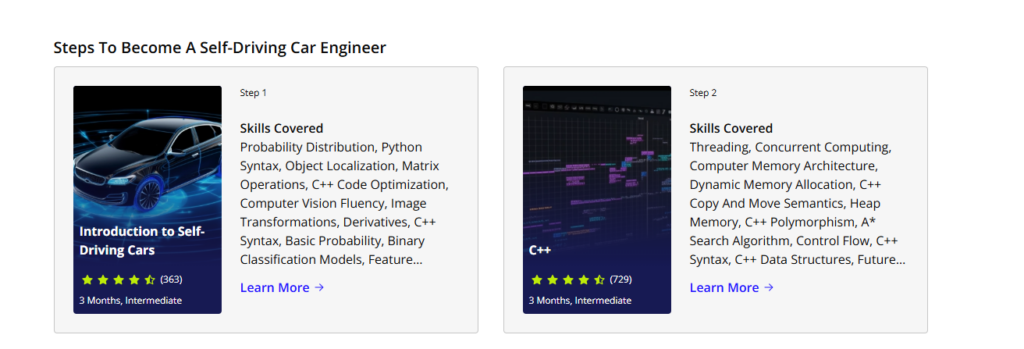
Udacity offers a variety of popular courses and specializations, particularly in the fields of technology and data science. Some of the most sought-after programs include:
- Data Science Nanodegree: This program covers data analysis, machine learning, and data visualization, equipping students with the skills needed to analyze and interpret complex data.
- AI Programming with Python Nanodegree: This course focuses on the fundamentals of programming in Python, as well as key concepts in artificial intelligence, including neural networks and natural language processing.
- Machine Learning Engineer Nanodegree: This specialization dives deeper into machine learning techniques, including supervised and unsupervised learning, and provides hands-on experience with real-world projects.
- Full Stack Web Developer Nanodegree: This program teaches students how to build and deploy web applications, covering both front-end and back-end development.
- Digital Marketing Nanodegree: This course provides insights into digital marketing strategies, including SEO, social media marketing, and content marketing.
- Cloud DevOps Engineer Nanodegree: This specialization focuses on cloud infrastructure and DevOps practices, preparing students for roles in cloud computing and system administration.
- Self-Driving Car Engineer Nanodegree: This unique program covers the technologies behind autonomous vehicles, including computer vision, sensor fusion, and deep learning.
These courses are designed to provide practical skills and knowledge that are highly relevant in today’s job market. Udacity Review 2025
Course structure and format
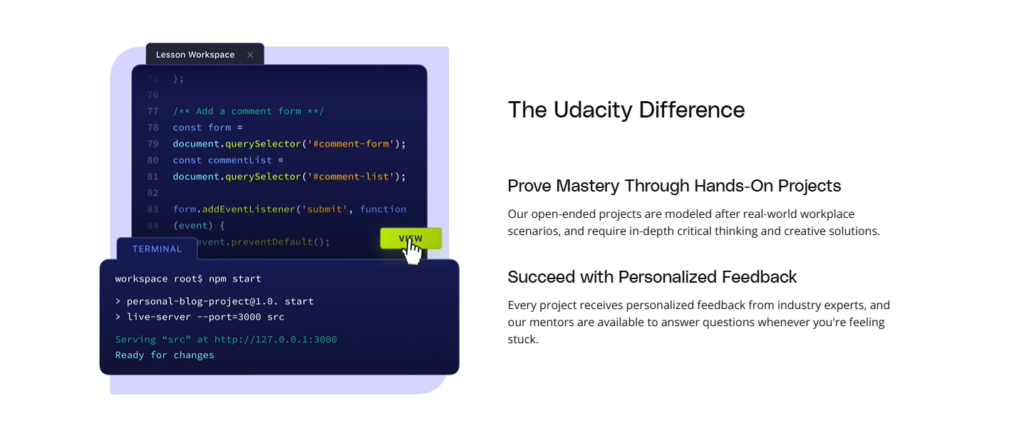
Udacity offers a variety of courses and programs, primarily focused on technology and professional development. The course structure and format typically include the following elements:
- Nanodegree Programs: These are comprehensive, project-based learning experiences that usually consist of multiple courses focused on a specific skill set, such as data science, artificial intelligence, or web development. Each Nanodegree program includes a series of projects that allow students to apply what they’ve learned.
- Self-Paced Learning: Most courses are designed to be self-paced, allowing learners to progress through the material at their own speed. This flexibility accommodates different learning styles and schedules.
- Video Lectures: Courses often feature video lectures delivered by industry experts. These videos are typically broken down into manageable segments, making it easier for learners to digest the information.
- Quizzes and Assessments: To reinforce learning, Udacity includes quizzes and assessments throughout the courses. These help learners gauge their understanding of the material and identify areas for improvement.
- Hands-On Projects: Practical projects are a key component of Udacity’s courses. Learners are required to complete real-world projects that demonstrate their skills and knowledge, which can also be added to their portfolios.
- Mentorship and Support: Many Nanodegree programs offer access to mentors who provide guidance, feedback, and support throughout the learning process. This can be particularly beneficial for learners seeking personalized assistance.
- Community Engagement: Udacity encourages interaction among learners through forums and community discussions, fostering a collaborative learning environment.
- Career Services: Some programs include career services, such as resume reviews and interview preparation, to help learners transition into new job roles or advance their careers.
Overall, Udacity’s course structure is designed to provide a comprehensive and engaging learning experience, focusing on practical skills that are relevant to the job market. If you have any specific questions about a particular course or program, feel free to ask! Udacity Review 2025
Qualifications of instructors

Udacity instructors typically possess a strong background in their respective fields, which may include the following qualifications:
- Industry Experience: Many instructors have significant professional experience in the tech industry, often holding positions at leading companies. This real-world experience allows them to provide practical insights and relevant examples in their teaching.
- Educational Background: Instructors often hold advanced degrees in their areas of expertise, such as computer science, data science, artificial intelligence, or software engineering. This academic foundation supports their knowledge and understanding of complex concepts.
- Subject Matter Expertise: Instructors are usually recognized experts in their fields, with a deep understanding of the latest trends, tools, and technologies. They may have published research, contributed to open-source projects, or been involved in significant industry initiatives.
- Teaching Experience: Many instructors have prior teaching or mentoring experience, whether in academic settings or through professional training programs. This experience helps them effectively communicate complex ideas and engage with learners.
- Continuous Learning: Given the fast-paced nature of technology, instructors often engage in continuous professional development to stay updated on the latest advancements and best practices in their fields.
- Collaboration with Industry Leaders: Udacity collaborates with industry partners to develop course content, and instructors may work closely with these partners to ensure that the curriculum aligns with current industry needs.
Overall, Udacity aims to provide learners with high-quality instruction from knowledgeable professionals who can effectively bridge the gap between theory and practice. If you have any specific questions about a particular instructor or course, feel free to ask! Udacity Review 2025
Breakdown of pricing models
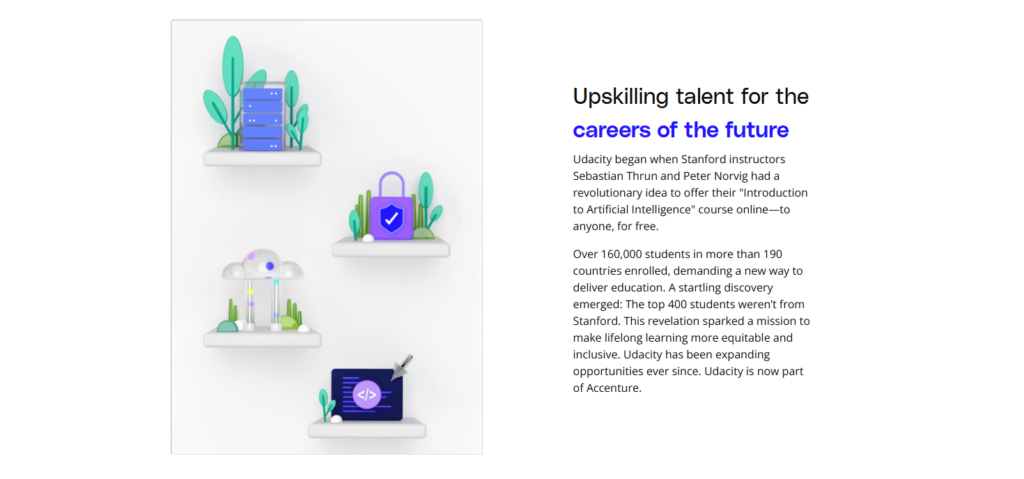
– Udacity Review 2024
Udacity offers several pricing models for its courses and programs, primarily focusing on its Nanodegree programs. Here’s a breakdown of the typical pricing structures:
- Nanodegree Programs:
- Monthly Subscription: Most Nanodegree programs operate on a monthly subscription model. Learners pay a fixed fee each month for access to the course materials, mentorship, and support. The subscription usually ranges from $399 to $499 per month, depending on the program.
- Discounts for Longer Commitments: Udacity often provides discounts for learners who commit to a longer duration. For example, if you pay for a multi-month subscription upfront, you may receive a discount, reducing the overall cost.
- Scholarships and Financial Aid: Udacity occasionally offers scholarships and financial aid options for eligible learners, which can significantly reduce the cost of enrollment.
- Individual Courses:
- Udacity also offers standalone courses that can be purchased individually. The pricing for these courses typically ranges from $99 to $199, depending on the course content and duration.
- Free Courses:
- Udacity provides a selection of free courses that cover various topics. While these courses do not offer the same level of support or certification as paid programs, they can be a valuable resource for learners looking to explore new subjects.
- Corporate Training:
- For organizations looking to upskill their employees, Udacity offers tailored corporate training solutions. Pricing for these programs varies based on the number of learners and the specific training needs of the organization.
- Promotions and Discounts:
- Udacity frequently runs promotions and offers discounts on specific programs or during special events. It’s advisable to check their website for any current offers.
Overall, Udacity’s pricing models are designed to provide flexibility and accessibility for learners at different stages of their careers. If you have any specific questions about a particular program or pricing details, feel free to ask! Udacity Review 2025
Comparison with other online learning platforms
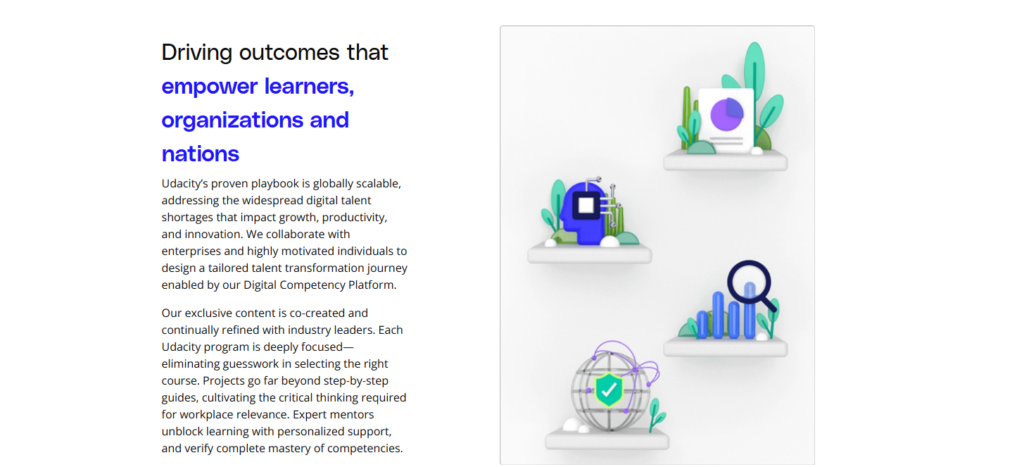
When comparing Udacity with other online learning platforms, several key factors come into play, including course offerings, pricing, learning format, and support. Here’s a breakdown of how Udacity stacks up against some popular online learning platforms:
- Course Offerings
- Udacity: Primarily focuses on technology and professional development, offering Nanodegree programs in areas like data science, artificial intelligence, programming, and digital marketing. Courses are project-based and designed in collaboration with industry leaders.
- Coursera: Offers a wide range of courses across various disciplines, including humanities, business, and technology. Partners with universities and organizations to provide professional certificates and degree programs.
- edX: Similar to Coursera, edX provides courses from universities and institutions worldwide, covering a broad spectrum of subjects. Offers MicroMasters programs and professional certificates.
- LinkedIn Learning: Focuses on business, technology, and creative skills, offering short courses and video tutorials. It’s more geared towards professional development and skill enhancement.
- Pricing Models
- Udacity: Operates primarily on a monthly subscription model for Nanodegree programs, typically ranging from $399 to $499 per month. Offers some free courses and occasional discounts.
- Coursera: Offers a mix of free courses and paid options. Professional certificates and specializations can range from $39 to $79 per month, while degree programs can be significantly more expensive.
- edX: Provides free access to course materials, with a fee for verified certificates. MicroMasters and professional certificates vary in price, often ranging from $200 to $1,500.
- LinkedIn Learning: Offers a subscription model at around $29.99 per month or $239.88 annually, providing access to thousands of courses.
- Learning Format
- Udacity: Emphasizes project-based learning with hands-on projects and real-world applications. Courses are self-paced, allowing learners to progress at their own speed.
- Coursera: Offers a mix of self-paced and scheduled courses, often including video lectures, quizzes, and peer-reviewed assignments.
- edX: Similar to Coursera, with a combination of self-paced and instructor-led courses. Many courses include interactive elements and assessments.
- LinkedIn Learning: Primarily video-based courses that are short and focused, allowing for quick learning. Content is often updated regularly.
- Support and Community
- Udacity: Provides mentorship and support for Nanodegree students, along with community forums for peer interaction.
- Coursera: Offers forums for discussion and peer feedback, but the level of support can vary by course.
- edX: Provides discussion forums and some courses may offer instructor support, but it varies by course.
- LinkedIn Learning: Limited community interaction; primarily focused on individual learning with access to course materials.
- Certification and Recognition
- Udacity: Offers certificates for completed Nanodegree programs, which are recognized in the tech industry but may not carry the same weight as degrees from accredited institutions.
- Coursera and edX: Provide certificates from recognized universities and institutions, which can enhance credibility in job applications.
- LinkedIn Learning: Offers certificates of completion that can be added to LinkedIn profiles, but they may not carry the same recognition as those from accredited institutions.
Conclusion
Udacity is particularly well-suited for learners looking to gain specific technical skills through project-based learning, especially in fields like data science and AI. In contrast, platforms like Coursera and edX offer a broader range of subjects and formal credentials from universities. LinkedIn Learning is ideal for professionals seeking quick, skill-focused courses. The best choice depends on individual learning goals, preferred subjects, and budget considerations. If you have any specific questions or need further details, feel free to ask!
Comparison with other online learning platforms
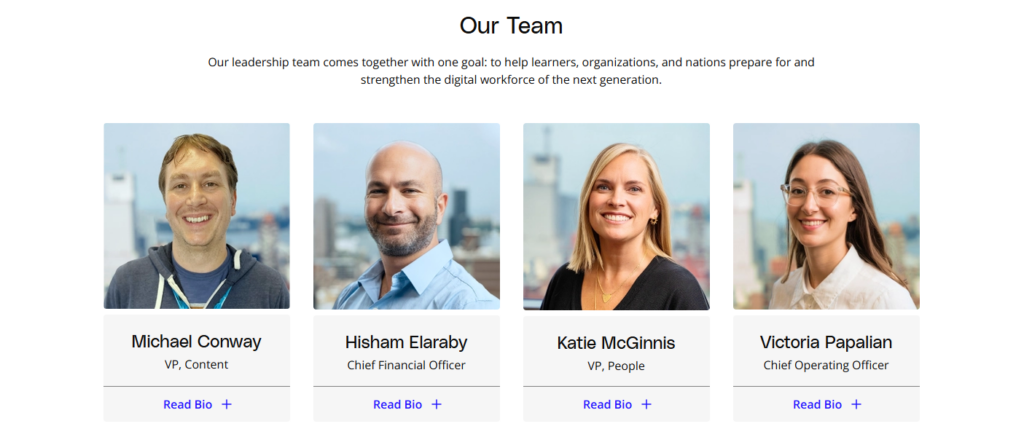
When comparing Udacity with other online learning platforms, several key factors come into play, including course offerings, pricing, learning format, and support. Here’s a breakdown of how Udacity stacks up against some popular online learning platforms:
- Course Offerings
- Udacity: Primarily focuses on technology and professional development, offering Nanodegree programs in areas like data science, artificial intelligence, programming, and digital marketing. Courses are project-based and designed in collaboration with industry leaders.
- Coursera: Offers a wide range of courses across various disciplines, including humanities, business, and technology. Partners with universities and organizations to provide professional certificates and degree programs.
- edX: Similar to Coursera, edX provides courses from universities and institutions worldwide, covering a broad spectrum of subjects. Offers MicroMasters programs and professional certificates.
- LinkedIn Learning: Focuses on business, technology, and creative skills, offering short courses and video tutorials. It’s more geared towards professional development and skill enhancement.
- Pricing Models
- Udacity: Operates primarily on a monthly subscription model for Nanodegree programs, typically ranging from $399 to $499 per month. Offers some free courses and occasional discounts.
- Coursera: Offers a mix of free courses and paid options. Professional certificates and specializations can range from $39 to $79 per month, while degree programs can be significantly more expensive.
- edX: Provides free access to course materials, with a fee for verified certificates. MicroMasters and professional certificates vary in price, often ranging from $200 to $1,500.
- LinkedIn Learning: Offers a subscription model at around $29.99 per month or $239.88 annually, providing access to thousands of courses.
- Learning Format
- Udacity: Emphasizes project-based learning with hands-on projects and real-world applications. Courses are self-paced, allowing learners to progress at their own speed.
- Coursera: Offers a mix of self-paced and scheduled courses, often including video lectures, quizzes, and peer-reviewed assignments.
- edX: Similar to Coursera, with a combination of self-paced and instructor-led courses. Many courses include interactive elements and assessments.
- LinkedIn Learning: Primarily video-based courses that are short and focused, allowing for quick learning. Content is often updated regularly.
- Support and Community
- Udacity: Provides mentorship and support for Nanodegree students, along with community forums for peer interaction.
- Coursera: Offers forums for discussion and peer feedback, but the level of support can vary by course.
- edX: Provides discussion forums and some courses may offer instructor support, but it varies by course.
- LinkedIn Learning: Limited community interaction; primarily focused on individual learning with access to course materials.
- Certification and Recognition
- Udacity: Offers certificates for completed Nanodegree programs, which are recognized in the tech industry but may not carry the same weight as degrees from accredited institutions.
- Coursera and edX: Provide certificates from recognized universities and institutions, which can enhance credibility in job applications.
- LinkedIn Learning: Offers certificates of completion that can be added to LinkedIn profiles, but they may not carry the same recognition as those from accredited institutions.
Conclusion
Udacity is particularly well-suited for learners looking to gain specific technical skills through project-based learning, especially in fields like data science and AI. In contrast, platforms like Coursera and edX offer a broader range of subjects and formal credentials from universities. LinkedIn Learning is ideal for professionals seeking quick, skill-focused courses. The best choice depends on individual learning goals, preferred subjects, and budget considerations. If you have any specific questions or need further details, feel free to ask!
Success Stories and Outcomes / Testimonials from former students of Udacity
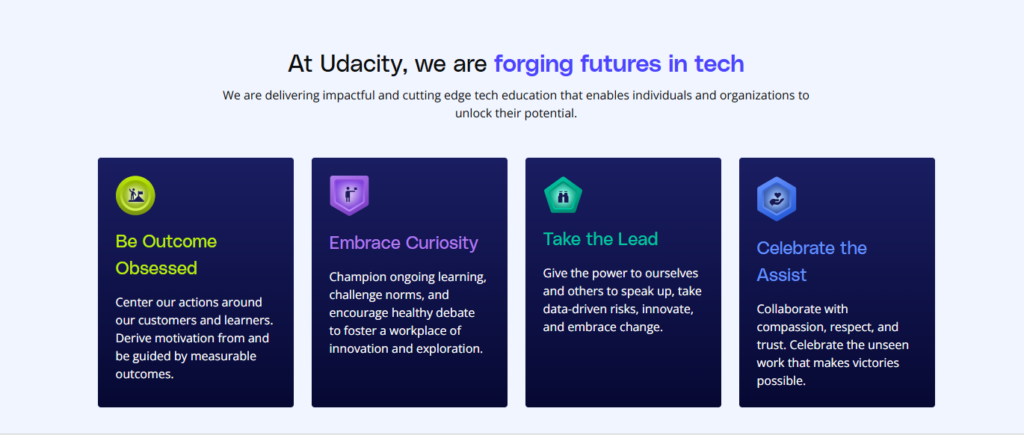
Udacity has garnered numerous success stories from its former students, showcasing the transformative impact of its programs on their careers and personal development. Here are a few testimonials that highlight these outcomes:
- John D. – Data Scientist:
“After completing the Data Science Nanodegree, I landed a job at a leading tech company. The hands-on projects and real-world applications provided by Udacity were instrumental in building my confidence and skills. I now work on exciting data-driven projects that impact business decisions.” - Maria S. – Front-End Developer:
“Udacity’s Front-End Web Developer Nanodegree changed my life. I transitioned from a retail job to a full-time developer role within six months of completing the program. The curriculum was challenging but incredibly rewarding, and the support from mentors was invaluable.” - Ahmed K. – AI Engineer:
“The AI Programming with Python Nanodegree equipped me with the foundational skills I needed to break into the field of artificial intelligence. I was able to secure a position at a startup focused on machine learning, and I’m now working on projects that I’m truly passionate about.” - Emily R. – Digital Marketer:
“I took the Digital Marketing Nanodegree to pivot my career, and it was one of the best decisions I’ve made. The course provided me with practical skills in SEO, content marketing, and analytics. I now manage marketing campaigns for a well-known brand and love what I do.” - Carlos M. – Cloud Developer:
“Completing the Cloud Developer Nanodegree opened doors for me in the tech industry. I gained hands-on experience with cloud technologies, which helped me secure a position at a major cloud service provider. The project-based learning approach was particularly beneficial.”
These testimonials reflect the diverse backgrounds of Udacity students and the significant career advancements they achieved through the platform’s specialized programs. Many former students emphasize the importance of practical experience, mentorship, and the supportive community that Udacity fosters.
Pros and Cons of Udacity

Udacity is a popular online learning platform that offers a variety of courses, particularly in technology and business. Here are some pros and cons to consider:
Pros:
- Industry-Relevant Curriculum: Udacity partners with leading companies like Google, Amazon, and IBM to create courses that are aligned with current industry needs, ensuring that learners acquire relevant skills.
- Nanodegree Programs: These are specialized programs that provide a structured learning path and often include real-world projects, which can enhance a learner’s portfolio.
- Flexible Learning: Udacity offers self-paced courses, allowing learners to study at their own convenience, which is ideal for those balancing work or other commitments.
- Support and Mentorship: Many Udacity programs include access to mentors who can provide guidance and feedback, enhancing the learning experience.
- Career Services: Udacity offers career support services, including resume reviews and interview preparation, which can be beneficial for job seekers.
Cons:
- Cost: Udacity’s courses, especially Nanodegree programs, can be relatively expensive compared to other online learning platforms, which may deter some learners.
- Limited Course Variety: While Udacity excels in tech-related fields, it may not offer as wide a range of subjects as other platforms like Coursera or edX.
- Self-Motivation Required: The self-paced nature of the courses requires a high level of self-discipline and motivation, which can be challenging for some learners.
- Variable Quality: While many courses are well-designed, the quality can vary, and some learners may find certain courses less engaging or comprehensive.
- No Formal Accreditation: Udacity’s programs are not formally accredited, which may be a consideration for those seeking recognized qualifications.
In summary, Udacity can be a valuable resource for those looking to gain specific skills in technology and business, but potential learners should weigh the costs and their own learning preferences before enrolling.
Who should consider Udacity?
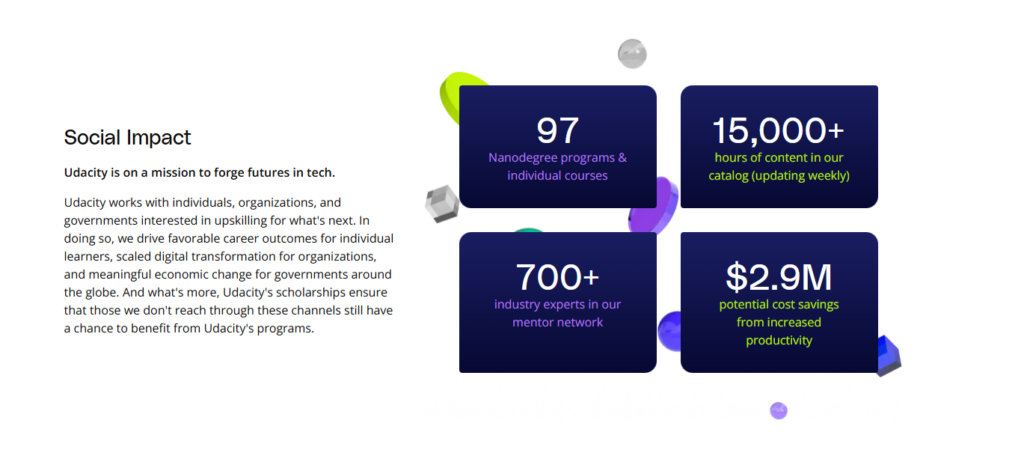
Udacity is a great option for a variety of individuals, including:
- Career Changers: Those looking to transition into tech fields such as data science, programming, or artificial intelligence can benefit from Udacity’s specialized programs.
- Professionals Seeking Skill Enhancement: Individuals already in the workforce who want to upskill or stay current with industry trends can find relevant courses to enhance their expertise.
- Recent Graduates: New graduates looking to gain practical skills and experience that complement their academic background may find Udacity’s hands-on projects particularly beneficial.
- Lifelong Learners: Anyone with a passion for learning and personal development can explore a wide range of topics offered by Udacity, from business to technology.
- Entrepreneurs: Those looking to start their own business can gain valuable insights and skills through courses focused on entrepreneurship and digital marketing.
Overall, Udacity is suitable for anyone motivated to learn and grow in their career, especially in the rapidly evolving tech landscape.
Final thoughts on whether Udacity is worth it
Determining whether Udacity is worth it depends on individual goals, learning preferences, and career aspirations. Here are some key considerations:
- Quality of Content: Udacity offers high-quality, industry-relevant courses developed in collaboration with leading companies. This can provide learners with valuable skills that are in demand in the job market.
- Hands-On Learning: The platform emphasizes practical, project-based learning, which can enhance understanding and retention of concepts. This approach is particularly beneficial for those looking to build a portfolio.
- Flexibility: Udacity’s self-paced format allows learners to study on their own schedule, making it accessible for those balancing work or other commitments.
- Career Support: Many Udacity programs include career services, such as resume reviews and interview preparation, which can be advantageous for job seekers.
- Cost Consideration: While Udacity’s programs can be more expensive than some other online learning platforms, the investment may be justified for those seeking specialized skills that can lead to higher-paying job opportunities.
- Personal Motivation: Success in any online learning environment often depends on the learner’s motivation and commitment. Those who are self-driven and proactive in their studies are likely to benefit the most.
In conclusion, if you are looking to gain specific skills in technology or business and are willing to invest time and resources, Udacity can be a worthwhile option. However, it’s essential to assess your personal learning style, career goals, and budget before making a decision.
FAQs about Udacity- Udacity Review 2025
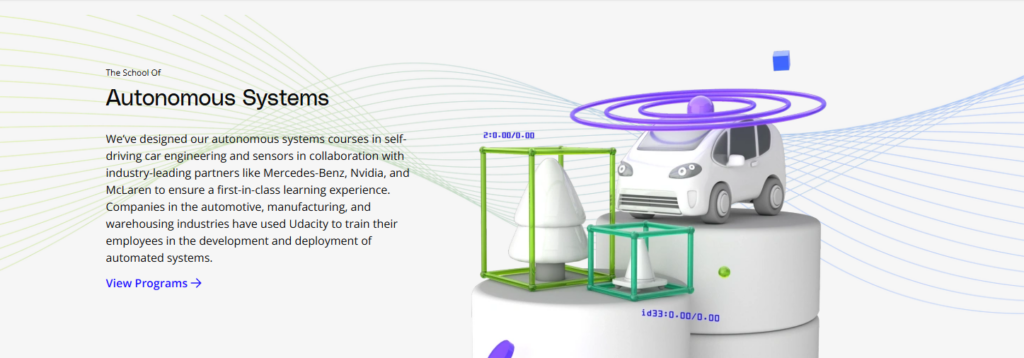
Here are some frequently asked questions (FAQs) about Udacity:
- What is Udacity?
Udacity is an online learning platform that offers courses and nanodegree programs in various fields, primarily focused on technology, data science, artificial intelligence, programming, and business.
- What are Nanodegrees?
Nanodegrees are specialized, project-based programs designed to teach specific skills in a particular field. They typically include a series of courses, hands-on projects, and mentorship support.
- How much do Udacity courses cost?
Course prices vary depending on the program. Nanodegree programs generally range from a few hundred to a few thousand dollars, with options for monthly payments or one-time fees. Udacity often offers discounts and scholarships.
- How long does it take to complete a Nanodegree?
The duration varies by program and individual pace, but most Nanodegrees are designed to be completed in 3 to 6 months with a commitment of about 10 hours per week.
- Are Udacity courses accredited?
Udacity courses and Nanodegrees are not formally accredited by traditional educational institutions. However, they are recognized by industry leaders and can enhance your resume and job prospects.
- What kind of support is available to students?
Udacity offers various support options, including mentorship, community forums, and career services such as resume reviews and interview preparation.
- Can I access Udacity courses for free?
While many courses are available for free, Nanodegree programs typically require payment. However, you can often access course materials without enrolling in a Nanodegree.
- What skills can I learn on Udacity?
Udacity offers courses in a wide range of skills, including programming languages (Python, Java, etc.), data analysis, machine learning, web development, digital marketing, and more.
- Is Udacity suitable for beginners?
Yes, Udacity offers courses for all skill levels, including beginner-friendly programs. Many courses start with foundational concepts before advancing to more complex topics.
- How do I enroll in a course?

